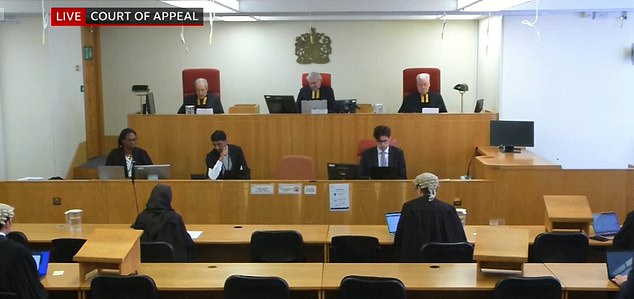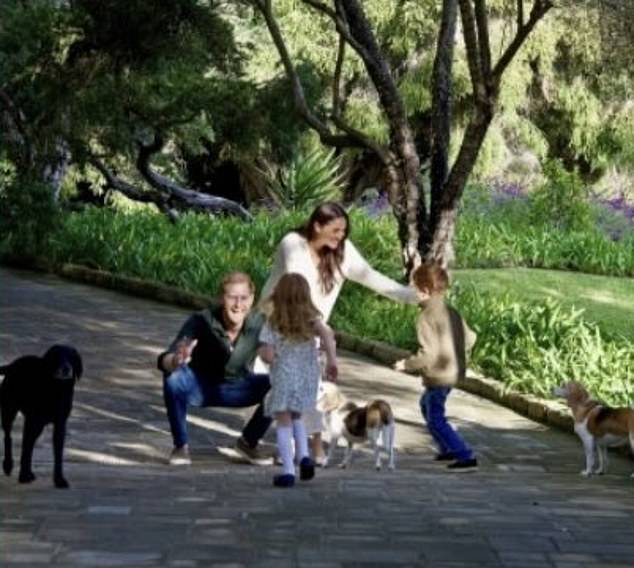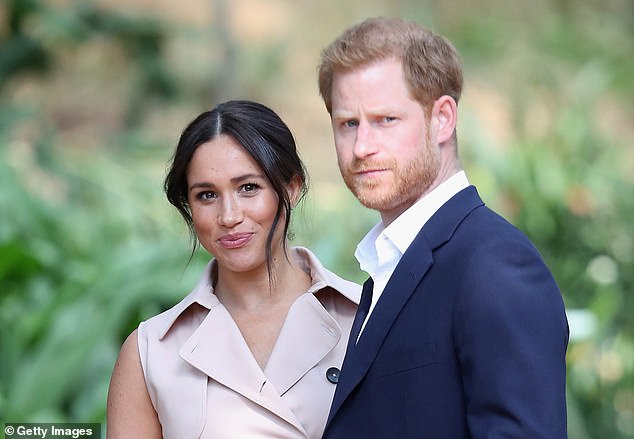Prince Harry today sensationally lost his battle for taxpayer-funded armed police bodyguards when in the UK – putting him on the hook for £1.5million in costs.
The Duke of Sussex believes he has been ‘singled out’ for ‘unjustified, inferior treatment’ since Megxit five years ago.
His barrister argued that the removal of Met Police armed bodyguards when he is in the UK has left the royal’s life ‘at stake’.
The California-based royal had fought the dismissal of his High Court claim against the Home Office over the decision of the Executive Committee for the Protection of Royalty and Public Figures (Ravec) that he should receive a different degree of protection when in the country.
But Sir Geoffrey Vos, Master of the Rolls, said in his ruling this afternoon in London: ‘These were powerful and moving arguments and that it was plain the Duke of Sussex felt badly treated by the system.
‘But I concluded, having studied the detail, I could not say that the Duke’s sense of grievance translated into a legal argument to challenge RAVEC’s decision’.
He added: ‘My conclusion was that the Duke of Sussex’s appeal would be dismissed’.
The King and his youngest son are believed to have differing views over Harry’s decision to pursue his legal fight with the Home Office. The Home Secretary is calling for the duke to pay all costs for both sides – a bill approaching £1.5million.
Today the Court of Appeal found against him, paving the way for an appeal to the Supreme Court if he wants to continue his fight and ever more costs.
It means that for now, armed police bodyguards, paid for by the British taxpayer, will not be automatically reinstated for him, Meghan and their two children when they are in the UK.

The Duke of Sussex at the Royal Courts of Justice on April 8 during his appeal against a High Court ruling preventing him getting automatic taxpayer-funded police protection in the UK. It was taken away following Megxit

Sir Geoffrey Vos, Master of the Rolls, pictured today as he rejected Harry’s appeal

The Duke of Sussex’s appeal against the dismissal of his legal challenge over the level of protection he and his family (pictured together at Christmas) is about his family’s right to security and safety, the court heard
At a two-day hearing in April, barristers for the duke told the Court of Appeal that he was ‘singled out’ for ‘inferior treatment’ and that his safety, security and life are ‘at stake’.
The Home Office, which is legally responsible for Ravec’s decisions, opposes the appeal, with its lawyers telling the court that Ravec’s decision was taken in a ‘unique set of circumstances’ and that there was ‘no proper basis’ for challenging it.
Sir Geoffrey Vos told today’s hearing: ‘Ms Shaheed Fatima KC, leading counsel for the Duke of Sussex, submitted that this case had an important human dimension. She submitted that the Duke of Sussex’s life was at stake because of the decision making in this case. She said that the bespoke process adopted by RAVEC had singled the Duke out for especially inferior treatment.
‘In effect, it had been pre-determined in the decision letter that, on future visits to the UK, the Duke of Sussex would be provided with a lower level of security than had been provided for him throughout his adult life.’
‘The impact of an attack upon him was obviously still just as significant as it had always been. His military service placed him at particular risk.
‘These were powerful and moving arguments, and that it was plain that the Duke of Sussex felt badly treated by the system.
‘But I concluded, having studied the detail of the extensive documentation, I could not say that the Duke’s sense of grievance translated into a legal argument’.
Sir Geoffrey Vos said he did not think Harry had been ‘able to demonstrate that the judge was wrong to determine’ that Sir Richard Mottram, then chairman of Ravec, had ‘good reason to depart’ from its policy document.
He said: ‘In this area of high political sensitivity, the court will inevitably have considerable respect for Sir Richard as a decision maker, whose expertise and experience in the field of Royal protection is probably unrivalled.’
Ravec has delegated responsibility from the Home Office over the provision of protective security arrangements for members of the royal family and others, with involvement from the Metropolitan Police, the Cabinet Office and the royal household.

The Duke of Sussex returned to London for the appeal
Last year, retired High Court judge Sir Peter Lane ruled that its decision, taken in early 2020 after the Duke and Duchess of Sussex quit as senior working royals, was lawful.
Shaheed Fatima KC, for the duke, told the court that he and the Duchess of Sussex ‘felt forced to step back’ from their roles as senior working royals as they felt they ‘were not being protected by the institution’.
After Ravec’s decision, al Qaida called for Harry ‘to be murdered’, and his security team was informed that the terrorist group had published a document which said his ‘assassination would please the Muslim community’, Ms Fatima added.
She continued that Ravec did not get an assessment from an ‘expert specialist body called the risk management board, or the RMB’ and came up with a ‘different and so-called ‘bespoke process’.
She said: ‘The appellant does not accept that ‘bespoke’ means ‘better’. In fact, in his submission, it means that he has been singled out for different, unjustified and inferior treatment.’
Ms Fatima added: ‘The appellant’s case is not that he should automatically be entitled to the same protection as he was previously given when he was a working member of the royal family.
‘The appellant’s case is that he should be considered under the terms of reference and subject to the same process as any other individual being considered for protective security by Ravec, unless there is a cogent reason to the contrary.’
Sir James Eadie KC, for the Home Office, said in written submissions that the duke’s appeal ‘involves a continued failure to see the wood for the trees, advancing propositions available only by reading small parts of the evidence, and now the judgment, out of context and ignoring the totality of the picture’.
He continued that Ravec treats the duke in a ‘bespoke manner’, which was ‘better suited’ to his circumstances.
Sir James said: ‘He is no longer a member of the cohort of individuals whose security position remains under regular review by Ravec.
‘Rather, he is brought back into the cohort in appropriate circumstances, and in light of consideration of any given context.’
Harry attended both days of the hearing at the Royal Courts of Justice, and could be seen taking notes and talking with part of his legal team during the appeal.
Parts of the hearing were held in private, meaning the press and public could not be in court, to discuss confidential matters.












